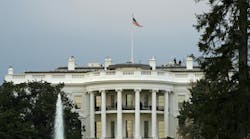A key Senate Republican predicted Congress can work out its differences on pending comprehensive energy legislation and send a proposal to the White House this year.
Republican Policy Committee Chairman Larry Craig (R-Ida.) said both Republicans and Democrats in the closely divided Senate have won and lost big policy issues.
"We would have liked to have seen more production, and they [Democrats] wanted it ‘greener,‘" Craig said. The Democratically controlled Senate voted against measures designed to lease a small portion of the coastal plain of the Arctic National Wildlife Refuge; it also turned back efforts to dramatically boost automobile fuel efficiency standards.
The Republican-controlled House last August passed a bill that includes ANWR leasing and does not increase automobile fuel standards by a meaningful amount. Craig predicted that ANWR would not survive a House-Senate conference, given the strong opposition the measure ran into in the Senate. But he expects the Senate to accept more energy tax incentives than what is currently in the bill. The House bill includes $33 billion in tax incentives, a figure the White House’s Office of Management and Budget Director Mitch Daniels has suggested is too high. Some House Republican leaders have said, however, that the White House supports their whole bill, including the tax provisions.
What kind of energy bill the White House will ultimately accept is still unclear, however, lawmakers say.
Craig did not speculate on what the White House is willing to accept; however, he said that he and fellow Republicans would urge colleagues to televise the final negotiations between the House and Senate leadership.
That would be a first for Congress, according to Senate sources, which noted that House-Senate conferences have never been televised. Reaction from House Republican leaders was not available at press time.
Senate action continues
Meanwhile, the Senate struggled to finish its own version of the bill after weeks of debate.
Senate leaders from both parties at presstime predicted the chamber would finish its version of the bill by Apr. 25, although several dozen amendments may still be considered before the legislation moves to a House-Senate conference.
On Apr. 23, lawmakers agreed, after an impasse the previous week, to include a $16 billion tax package in the bill that includes a tax credit designed to encourage industry interest in the construction of a trans-Alaskan gas pipeline. North Slope gas producers get a tax credit when benchmark prices in Alberta fall below $3.25 (US)/Mcf, but if prices rise above $4.85/Mcf, the companies must pay the tax back. The credit would stay in place for 15 years after the line was built, and the payback provision would not expire until all of the credits were paid back.
A sponsor of the proposal, Sen. Frank Murkowski (R-Alas.), said the amendment should have no net cost to taxpayers because the payback provisions will require the companies to pay back any tax relief granted during periods of high natural gas prices.
Still included in the overall bill is a $10 billion loan guarantee provision for pipeline owners, predicated on a southern route traversing Alaska. The House bill does not offer any kind of tax incentives for the line but does seek to mandate the same southern route, which parallels the oil pipeline to Fairbanks and then the Alaska Highway to British Columbia. Producers have also been considering a northern route across the Beaufort Sea into Canada’s Mackenzie Valley.
In February, the Senate Finance Committee passed a $14 billion energy tax bill that contains about $4 billion in credits and incentives for the oil and gas industry over 10 years (OGJ Online, Feb. 14, 2002).
The House bill includes about $8 billion in tax measures specifically geared toward the oil industry over the same 10-year period. Citing budget concerns, the White House has not campaigned for industry-related tax provisions in either bill. But neither President George W. Bush nor his advisors has signaled he would veto an energy package that includes large tax breaks.
Interior amendments
Two Senate amendments that passed by unanimous consent include a provision urging the secretary of the Interior, through the US Geological Survey, to enter into "appropriate arrangements" with state agencies that conduct geological survey activities to collect, archive, and provide public access to data and study results regarding oil and natural gas resources. The secretary may accept private contributions of property and services to carry out that mission, according to the amendment.
Another industry-related provision calls on Interior to undertake a review of existing authorities to resolve conflicts between the development of federal coal and the development of federal and nonfederal coalbed methane in the Powder River basin in Wyoming and Montana: "Not later than 90 days from enactment of this act, the secretary shall report to Congress on her plan to resolve these conflicts.’’
A third provision calls on Interior to improve inspection and enforcement of oil and gas activities, "including enforcement of terms and conditions in permits to drill."
Ethanol debates
Meanwhile, a clean fuels proposal to triple ethanol use within the decade is also expected to survive Senate debate, despite efforts by California and New York lawmakers to dramatically revise the plan.
On Apr. 23 the Senate voted 68-31 to defeat an amendment by Sen. Charles Schumer (D-NY) that sought to eliminate the renewable fuel standard (RFS)–essentially an ethanol mandate–in the bill. One small revision that is likely to win Senate approval is an effort by Sen. Diane Feinstein (D-Calif.) to reduce the time a state must wait before seeking an emergency waiver from the RFS standard to 90 days from 240 days. Feinstein had sought a 30-day waiting period that was rejected. But all other attempts to change the clean fuels proposal–such as a bid by Sen. Barbara Boxer (D-Calif.) to remove liability protection for companies that produce and blend ethanol and other additives to meet the mandate–were defeated.
Opponents of the measure argued that the RFS could cause gasoline prices to rise, because there is no guarantee there will be enough ethanol to meet consumer demand. But a powerful coalition of farm groups and major oil companies said they are confident the program offers enough flexibility that costs to consumers would be negligible. Even though the House does not include a clean fuels proposal in its own bill, lobbyists expect it to survive in final legislation given to the White House.
Meanwhile, the Federal Trade Commission told House lawmakers it may consider taking a closer look at whether some fuel ethanol producers and importers engage in price-fixing.
Fuel efficiency
Another controversial proposal the Senate is expected to revisit is a plan designed to increase automobile fuel efficiency. A bipartisan plan by Sens. Tom Carper (D-Del.) and Arlen Specter (R-Pa.) is designed to force automakers to build more energy-efficient vehicles by requiring that petroleum consumption for transportation use drop by 1 million b/d by 2015.
The House bill requires the Department of Transportation to issue Corporate Average Fuel Economy standards designed to save at least 5 billion gal of oil during 2004-10. Opponents of the House bill say that, by that standard, DOT would not have to raise CAFE beyond the current 27.5 mpg mark for cars and 20.7 mpg for light trucks that have been in place for 15 years.
ANWR loss
In an action that at least one environmental group called "their biggest political win in years," a bipartisan group led by Senate Democratic leaders effectively turned back a proposal to allow leasing in a limited portion of the Arctic National Wildlife Refuge.
"I think it really comes down to this: We are just not going to allow Republicans to destroy the environment," said Senate Majority Leader Tom Daschle (D-SD) on the eve of the vote Apr. 18.
Later that day the Senate voted 54-46 to uphold debate by ANWR drilling opponents Sens. John Kerry (D-Mass.) and Joe Lieberman (D-Conn.), making it difficult, but not impossible, for leasing proponents to secure a vote on the issue.
Five Democrats voted with 41 Republicans to allow ANWR leasing: Sens. Daniel Akaka and Daniel Inouye from Hawaii, John Breaux and Mary Landrieu from Louisiana, and Zell Miller of Georgia. But 8 Republicans broke ranks with the White House and voted with 45 Democrats (along with Independent Sen. Jim Jeffords (Vt.) to block the amendment: Sen. Lincoln Chafee (RI), Maine Sens. Susan Collins and Olympia Snowe, and Sens. Michael DeWine (Ohio), Peter Fitzgerald (Ill.), John McCain (Ariz.), Bob Smith (NH), and Gordon Smith (Ore.).
On a related procedural vote, the Senate also in effect turned back, by a vote of 64-36, an attempt by Alaska Sen. Ted Stevens (R) to link ANWR revenues to benefits for steel workers.
Murkowski vowed after the votes that the ANWR issue would resurface, saying that for national security reasons, "sooner or later, this nation will open up ANWR."
The Republican-led House passed a sweeping energy bill last August that includes a provision to allow the Department of Interior to lease a portion of the ANWR coastal plain.
Iraq oil ban
A few hours after the ANWR-related procedural votes, the Senate by an 88-10 margin gave Murkowski a minor victory by approving amendment to the bill that bans Iraqi oil imports into the US. Iraq sells oil on world markets under a United Nations humanitarian program designed to block President Saddam Hussein from controlling any of the revenue. Under the oil-for-aid program, the US was importing about 1 million b/d until earlier this month, when Saddam decided to stop all oil shipments in protest against US policies toward Israel.
Murkowski said the US should ban oil from Iraq, because the UN program has not succeeded in preventing Saddam from using petrodollars to fuel his own war machine.
Oil companies did not publicly lobby against the amendment but are troubled by the Senate’s action. They have privately told the White House the measure could exacerbate gasoline price spikes because several refineries are optimized to run on Iraqi crude.
The White House has been largely silent on the issue, although the day after the vote the Department of State indicated the White House would urge lawmakers to drop the Iraqi amendment when the energy bill is negotiated in a House-Senate conference later this spring. The House bill does not include a ban on Iraqi oil.
International trade sanctions already prevent Iraq from selling oil directly to US companies; and even without the Senate action, President Bush has the authority if he so chooses to ban US companies from participating in the UN oil program. Murkowski’s amendment also has a big loophole for the White House to use if it so chooses: It gives the president the authority to waive the ban if an embargo would be "inconsistent with the national security and foreign policy interests of the US."
Under the amendment, the ban would be lifted if Iraq allows UN inspectors back in the country to certify that Baghdad is complying with UN regulations for the oil-for-aid program and is not stockpiling nuclear or biological weapons.
Senate Energy Committee Chairman Jeff Bingaman (D-NM) opposed the provision, noting that at the time of the vote the White House had not yet indicated whether a ban would help or exacerbate US efforts to broker a Middle East peace. Bingaman also suggested the ban would have little to no impact on Iraq, because the country could simply sell the oil to European and Asian buyers instead of the US.

